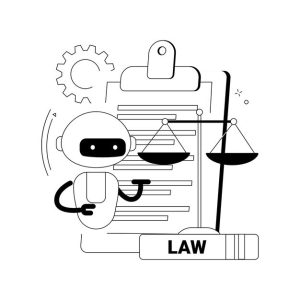Artificial Intelligence (AI) is transforming the world of business and the process of contract creation is not an exception. As AI-enabled technologies claim to write valid legal contracts in a few minutes, the business community has a vital query:
Are AI-generated contracts legally binding?
The question is more direct than you may imagine: Yes, they are; provided they satisfy the most fundamental of legal requirements of a contract. However, there are other factors one needs to pay attention to before entrusting their legal contracts to AI. Let’s try to make it simpler.
What Makes Any Contract Legally Binding?
To talk about AI, it is necessary to know what qualities make a contract enforceable in the guideline. All valid contracts should consist of the following four elements regardless of whether they were written by an attorney or AI:
- Offer – A clear proposal outlining the terms of the agreement.
- Acceptance – The other party agrees to the offer without changes.
- Mutual Intent – Both parties are oriented to the fact that they sign a legal agreement.
- Consideration – Something of value exchanged by both parties (money, services, goods, or a promise).
As attorney Morvareed Salehpour points out, “There are any number of things that can be a binding contract if it includes these elements. It need not be even written, they can just be oral agreements.
Thus if an AI-made document contains these features, it can be enforced by law.
Does the Law Treat AI-Generated Contracts Differently?
The simple answer: No.
The written contract is all the law needs to worry about who or what drafts it. The important thing is that the agreement should portray a clear intention of the parties and should be legally acceptable. The current U.S. laws do not restrict the use of AI in contract drafting.
As Morvareed puts it:
When the aspects of offer, acceptance, intent and consideration exist then a contract entered with the help of AI can be lawfully binding.
Yet, both text produced by a human and AI may not be drafted as a high-quality contract, which fosters disputes, ambiguity, and even litigation.It is essential that things be clear and precise.
Who Is Responsible for an AI-Drafted Contract?
If AI writes your contract, who is liable for mistakes? The AI tool provider? The AI itself?
According to the law, you as a user are liable. Just that, AI tools are tools. Similar to a GPS, the AI can help but you are the driver. Before signing the contract, you have to go through and edit the paperwork and accept.
The use of disclaimers that limit liability is most often present as almost all the AI platforms do carry these disclaimers, and in case of something going wrong, this usually falls on the side who uses the tool; whether a person or a business.
Benefits of AI-Generated Contracts
Some of the benefits associated with AI, particularly to small businesses and startups which require access to inexpensive legal services, include:
- Speed: It takes a few minutes to create the contracts.
- Cost Efficiency: Reduces legal costs for routine documents.
- Consistency: Minimizes errors in repetitive agreements.
AI tools can be used best in simple and repetitive contracts, such as Non-Disclosure Agreements (NDAs), basic service agreements, vendor terms, etc.
When AI Isn’t Enough
AI can be useful in straightforward, low-risk contracts, but this is not a substitute for the use of lawyers when there are complex situations. Valuable contracts or contracts specific to industries, most of the times, demand legal knowledge, including:
- Mergers and acquisition
- Licensing agreements
- Strategic partnerships
- Sells in highly regulated sectors (banks, medicine etc.).
The AI can help in initial draft levels but a lawyer is required to look over and complete the document.
Key Risks to Watch Out For
Before signing an AI-generated contract, always check for:
Accuracy – Are all terms correct and complete?
Legal Compliance – Does the contract follow local laws and industry rules?
Clarity – Are all roles, duties, and expectations explained clearly?
Custom Needs – Avoid relying solely on generic boilerplate clauses.
Without review, you may not notice some crucial terms or you may have old legal words or provisions that are not applicable to your particular deal.
The Best Approach: AI + Human Expertise
A hybrid solution is the best and safest way:
- Write the contract in a very short time with AI.
- Make a lawyer inspect it to see how accurate and complying.
This method combines AI’s efficiency with legal expertise, cutting time and costs while ensuring enforceability.
As an example, even when you will use an AI tool to create an NDA, a lawyer must review and approve it. When that template is tested, one then has confidence to use it in future.
How to Introduce AI into Your Workflow
Begin with the low-risk, routine contracts such as NDAs and the service agreements. Get used to these and then proceed with other, more complicated documents.
Using AI tools is effective regarding repetitive tasks, so your legal and business teams can concentrate on their strategy. However, even in the situation of the simple agreement, the checking by people is needed since the agreement should be legal and reflect their intentions.
So, Are AI-Generated Contracts Legally Binding?
Yes, just so that they have the basic aspects of the law: offer, acceptance, intent and consideration. It is the contents and not the authors of the law.
But AI is not a substitute for professional legal advice. It’s a time-saving tool, not a complete solution. The smartest strategy? Use AI for drafting, then confirm accuracy with a lawyer.
AI can make contract creation faster, cheaper, and more efficient—but ultimate responsibility lies with you.
Final Thoughts
Artificial intelligence is changing contract processes and legal practices are becoming easier and affordable. Companies that implement and integrate AI with human supervision will have access to both worlds, faster, cheaper, and legally secure.
Utilized intelligently, AI makes contracts, but it enables the business as a whole to act more quickly and smartly, and without compromising compliance and transparency.










